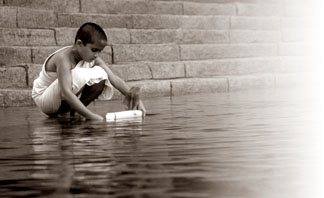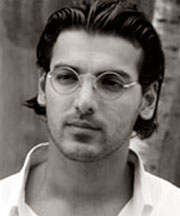|
observer |
|
|
|
|
|
OTHER LINKS |

|

|

|
Deepa Mehta's film 'Water':A thorough Drench
Another widow? You follow her and find a seat for yourself on the One-Five-Four, at the Bambalapitiya junction and jump out of your skin again, when yet another woman, clad in a white blouse sits next to you. Widows? Widows, widows? If you are wearing the same shoes as mine, if you too have already seen Deepa Mehta's 'Water" you might recognize my agitation. From now on, for a long time to come I know whenever I see a woman in white my mind will keep returning to the dilapidated two storied house in Varanasi during the 1930s, to the fourteen destitute Hindu widows in their white saris with the haunting "death-wish" in their eyes. No wonder Deepa Mehta had to abandon the filming of the last of her trilogy, in India, after mobs of fanatics destroyed the sets and burned her effigy. "Water" is a movie sure to drown fascist groups who support religious oppression to the very core of their warped minds. What a relief to know that our ancestors never followed the Brahmins of India, who, according to the sage near the holy river in the movie, had created traditions that dictated widows should have three options; throwing themselves on the funeral pyre with their husband, living a life of poverty and chastity, or marrying the dead husband's brother, if he is available. That, these are laws made by men is subtly brought out by Chuiya who asks the sage "Why are there no houses for widow men?'" she is "shhhd, shhhd" by the other widows who pray 'Don't let such a fate befall our men". When Auntie, whose every waking minute is spent yearning for Gulub-jamuns and yellow laddoos, passes away Shakuntala hopes in her next life she will be fortunate enough to be born a man. Men, they hold the reigns of society in Colonial India and, by preventing Deepa Mehta from producing the movie in India has shown that even today, things have not changed. Traditions created by Brahmins oppressing fellow human beings regardless of gender seem to still dominate Indian society. Gandhiji's wish to change the Old Order seems not to have succeeded, because, as the illiterate Kalyani points out to Narayan the decision to choose between traditions and the new ways lies within the individual. Narayan may change, but not his father who advises his son to keep Kalyani as a mistress because women should consider it a blessing to sleep with a Brahmin, nor his friend, who, though romantic enough to misquote Byron and quote Romeo and Juliet, sees nothing wrong in his old man using the widows in the ashram to fulfill his carnal desires. He openly tells Narayan that his father does not even know the names of the widows who come to him and calls them 'the old one, the new one, etc". Impossible though it seems Deepa Metha has poured life into an "untouchable" topic through the lives of eight-year old Chuyia (Sarala), the young widow forced into prostitution Kalyani (Lisa Ray), the devout, middle-aged Shakuntala (Seema Biswas), and the idealistic lawyer Narayan (John Abraham). Here's excellent cinematography and excellent casting, from Chuiya's dying husband to the man who fries Laddoo to Kaalu the dog, moving at breathless speed, from the moment the film begins you are literary thrown into a monstrous current, tossed, heaved, drenched and finally cast on the shore, panting for breath. If your idea of entertainment means "entertaining an issue" and if you wish to see a movie that speaks the truth rather than leading you into a world of make-believe, 'Water' is for you. Be prepared for a thorough drenching however strong or 'water-proof" you might think you are. By the time the credits come and the lights are switched on, your eyes too will be filled with it. No kidding. **** "I have had my bones broken a few times and my heart broken a lot"
Of Iranian Catholic decent Abraham says "I have lived in Mumbai (Bombay) all my life. I've played hard and rough through my years at Bombay Scottish School and in college. I've earned the respect of friends and the love of a few women. I've had my bones broken a few times, and my heart broken a lot." Though he does not reveal how old he is on his website he talks candidly about how he began his career in advertising "I was a Media Planner at Enterprise-Nexus, an ad agency in Mumbai (which is now part of the WPP Group). I wasn't there long enough to find out if I would have been any good. But for reasons of argument, let's say I was. Some time later at a party, a woman was pleasantly lewd enough to mention that I filled up my jeans quite nicely. What with one thing and another, I landed a gig for the Live-In Jeans brand..." He has this to say about the journey he made as an actor which made its zenith in the role he played as Narayan in "Water", "I didn't fancy myself as an actor till I was plumb in the middle of it all. When Pritish Nandy offered me a role in a movie project, I was a little nonplussed. Although the project was shelved, it opened up a new door for me. I spent a lot of time watching movies and studying great actors to try and build a screen persona of my very own. The movie, Jism, was released on 17 January 2003. It immediately pushed me into the public eye. After that, I acted in a number of projects that helped me polish the little pebbles that I now recognize as diamonds today. Dhoom was the most fun I've had with my pants on. Mostly because I got to ride around on the Suzuki Hayabusa, reputed at that time, to be the fastest motorcycle in the world. I was hardly acting there. The thrill was all very, very real. By the time Viruddh came along, I was delving deeply into my abilities to find different things I could do and with the help of some outstanding directors, managed to create a variety of niches where I did my best work. My next movie, Water opened at the Toronto Film Festival, a humbling event as any I have ever seen. There were many rounds of applause for me and the rest of the cast at the event, and I began to see the beginnings of a wider audience for Indian films. (I refuse the term 'Bollywood'. I find it terribly subservient.)" |
 You stare at her with a fast beating heart. Dressed in white from
head to toe, she walks towards you, with the shawl wrapped round her
head swaying in the evening breeze. A widow? Another, clad in a white
sari casts a puzzled look at you before boarding the bus near the
Majestic City cinema.
You stare at her with a fast beating heart. Dressed in white from
head to toe, she walks towards you, with the shawl wrapped round her
head swaying in the evening breeze. A widow? Another, clad in a white
sari casts a puzzled look at you before boarding the bus near the
Majestic City cinema.  Its' no secret that John Abraham as Narayan, with his designer-chic
stubble, shoulder length scraggy hair and gold-rimmed spectacles steals
the show, not only because he is good-looking but also because he has no
competitors.
Its' no secret that John Abraham as Narayan, with his designer-chic
stubble, shoulder length scraggy hair and gold-rimmed spectacles steals
the show, not only because he is good-looking but also because he has no
competitors. 





